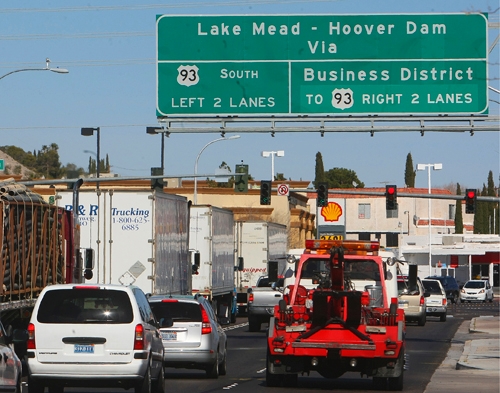Toll roads proposed for I-15, Boulder City

CARSON CITY — Drivers could have the option of paying tolls to bypass congestion in Boulder City, Las Vegas and throughout Nevada under a bill being considered in the Legislature.
Senate Bill 83, sponsored by the Nevada Department of Transportation, would strike a provision in the law that prohibits toll roads and allow the state to pursue partnerships with private companies that could build, manage and collect fees on the highways.
Proponents see it as a way to attract $1 billion or more in private investment for road improvements and construction along Interstate 15 in Clark County and for a proposed bypass around Boulder City.
They see potential for tens of thousands of jobs, less congestion and the opportunity to connect funding for highway infrastructure to the people who use it most.
Critics are wary it would pave the way to the privatization of Nevada’s highways by "Wall Street thugs" whose profit motive would unnecessarily increase construction and maintenance costs.
Both sides made their case Tuesday during a hearing by the Senate Committee on Transportation.
Proposals to lift Nevada’s legal ban on toll roads have been floated and sunk during previous legislative sessions.
But some observers say there’s more momentum to end the prohibition this year because the struggling economy has sapped the state’s resources to invest in roads and proponents have amended the bill to alleviate concerns that dragged down previous attempts.
"I wouldn’t say there is an appetite to do it," said Sen. Mike Schneider, D-Las Vegas, a critic of the bill. "I would say we are forced in a position where we have to do it."
During the hearing, Schneider said that for decades Nevada has neglected to raise enough money in taxes to keep up with demand for roads.
The result, he said, is a backlog nearing $9 billion worth of projects the state can’t afford to build.
Partnerships with "Wall Street thugs," a term he used in reference to investment bank Goldman Sachs’ interest in road projects, would unnecessarily increase the costs for users, he said.
"We are forced into a position to do public-private partnerships, and we are going to pay somebody a large profit to bail us out of our financial problem," Schneider said.
SB83 is one of two Senate bills seeking to strike Nevada’s toll prohibition. The other, Senate Bill 214 by Sen. Joe Hardy, R-Boulder City, seeks to lift the ban and make the proposed $400 million Boulder City bypass a demonstration project for public-private partnerships.
The bypass, which backers say could link to the proposed Interstate 11 project to connect Las Vegas with Phoenix, would ease congestion that’s clogging Boulder City in part because of the addition of a new bridge over the Colorado River near Hoover Dam.
The current toll prohibition, Hardy said, makes it difficult to seek proposals from private companies to construct the bypass.
Lifting it "will allow the conversation to be more meaningful in that it will allow the real deal to be discussed," he said.
Others see ending the prohibition as a way to create tens of thousands of badly needed construction jobs.
State Transportation Director Susan Martinovich said there are as many as $1 billion in improvements that could be done on Interstate 15 if the state could get private companies to invest in the work in exchange for a share of tolling revenue.
"We think there is a good opportunity to bring in some outside money into the state," she said before the hearing. "There are people who want to invest in transportation infrastructure because typically the returns are stable."
Toll proponents included multiple provisions in SB83 to assuage concerns about private companies taking too much control and delivering too little in return.
An amendment would preclude charging tolls for roadways already in place, meaning any private investor would have to construct new lanes or new roads in order to apply a toll.
The amendment would prevent tolls being applied to roads that taxpayers already paid for and ensure non-toll routes remain as an option for drivers.
The bill also includes a provision that would require that when the private-public agreement is over, the roads must be in good condition.
Scott Rawlins, deputy transportation director, said the fact that toll roads need to compete with toll-free roads is an incentive for operators to keep them in good condition.
"These facilities are a business," Rawlins said. "Those private investors want to make sure their investments are managed like a business. They want repeat customers."
Sen. Michael Roberson, R-Las Vegas, attended the transportation hearing and sat in the audience.
Afterward he criticized Schneider and Sen. Mark Manendo, D-Las Vegas, for flak they gave witnesses during testimony.
Roberson said the toll bill should be given a priority because of the potential to drive investment that could create construction jobs, something Democratic leaders have said is the No. 1 issue of the legislative session.
"We do need more private money coming into this state," Roberson said. "There should not be a member on that committee who doesn’t vote for this."
Still, concerns remain. A witness from the American Civil Liberties Union of Nevada testified in favor of the concept but said there should be specific provisions to ensure data collected with electronic toll payments remain private.
A witness from the Nevada Motor Transport Authority, a trucking industry group, raised the specter of troubled public-private partnerships in other states in testimony against the plan.
The committee didn’t take a vote on the measure.
Contact reporter Benjamin Spillman at bspillman@reviewjournal.com or 702-477-3861.